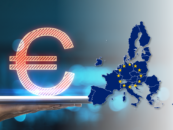
Demand for Digital Identity Verification Surges Amid Booming Virtual Banking Sector
by Fintechnews Switzerland November 23, 2021An evolving regulatory landscape, rising digital adoption and the surge in fintech usage is pushing demand for digital identity verification. By 2026, the industry is expected to generate US$17.2 billion in revenue, translating to a compound annual growth rate (CAGR) of 22% over the six-year period, a new report by analyst and consultancy company Goode Intelligence.
Identity verification ensures that there is a person behind a process matches the one that is supposed to be. It’s an essential requirement in most procedures to avoid fraud and theft, and is referred to know-your-customer (KYC) in the banking sector.
Identity verification is ever-so relevant today as interactions are increasingly moving online, forcing financial institutions to embrace new methods to remotely verify users, ensure genuineness and comply with KYC, anti-money laundering (AML) and countering financing of terrorism (CFT) requirements.
In 2020, financial companies around the world were fined a collective US$10.6 billion for regulatory non-compliance, including AML/KYC non-compliance, according to the AML/KYC Tracker by payment news platform Pymnts and online identity verification services provider Trulioo.
Digital fraud against consumers has also increased by 24% for the period from January to April 2021, compared to the period from September to December 2020, the report says.
In June 2021, the German Federal Financial Supervisory Authority (BaFin) fined digital bank N26 EUR 4.25 million for weak AML controls over the years 2019 and 2020.
In Europe, new reforms are in the works and are to set to make the regulatory landscape more complex for financial institutions. The European Commission (EC) is currently expanding its AML efforts and working on new regulation on AML/CFT.
The legislative proposals aim to strengthen the European Union (EU)’s AML/CFT rules, introducing measures to enhance the existing framework by taking into account new and emerging challenges linked to technological innovation including virtual currencies.
The EC will also be creating a new EU authority to fight money laundering. The new authority is expected to be operational in 2024.
At the same time, neobanks are surging in popularity, further increasing risks. Exton Consulting estimates that as of early 2021, more than 50 million clients had opened a neobank account in Europe.

EXTON RESEARCH, Report Neobanks 2021 Shifting from growth to profitability
The booming digital identity verification sector
These factors are driving the demand to digitally onboard customers in a compliant and efficient manner. This will result in over 3.8 billion separate identity checks annually by 2026, up from 1.1 billion checks by the end of 2021, according to the Goode Intelligence research.
Financial institutions around the world are rapidly implementing innovative solutions to address AML/CFT concerns and requirements.
British financial services company Hargreaves Lansdown recently implemented the HooYu and Equifax customer onboarding KYC journey into its technological ecosystem to create a faster and frictionless method of verifying identity for its clients.
In Lithuania, Nexpay is teaming up with Ondato to run all KYC, AML and e-signature processes through its compliance management platforms to prevent fraud and enable smooth digital onboarding. Nexpay is banking infrastructure provider for the digital assets industry, offering services including accounts and payments.
The red hot digital identity verification industry has attracted close to US$1 billion in investment in H1 2021, says Alan Goode, founder and CEO of Goode Intelligence and author of the report, and the trend is showing no sign of slowing down going into 2022 .
Just this month, US identity verification startup Socure raised a US$450 million Series E funding round, bringing its valuation to US$4.5 billion, up from US$1.3 billion this March when it raised US$100 million in its Series D.
Socure provides a predictive analytics platform. It leverages artificial intelligence (AI) and machine learning (ML) techniques with online and offline data intelligence from email, phone, address, IP, device, velocity, and the broader Internet to verify identities in real time.
Jumio, another US startup, closed a US$150 million funding round in March. Jumio has built a platform that provides a variety of digital identity tools and technology, using biometrics, ML, computer vision, big data and more to run checks on identity documents and log-ins. Jumio currently has around 1,000 customers including HSBC, United Airlines and the telecommunications operator Singtel.
Featured image credit: Technology photo created by rawpixel.com – www.freepik.com





